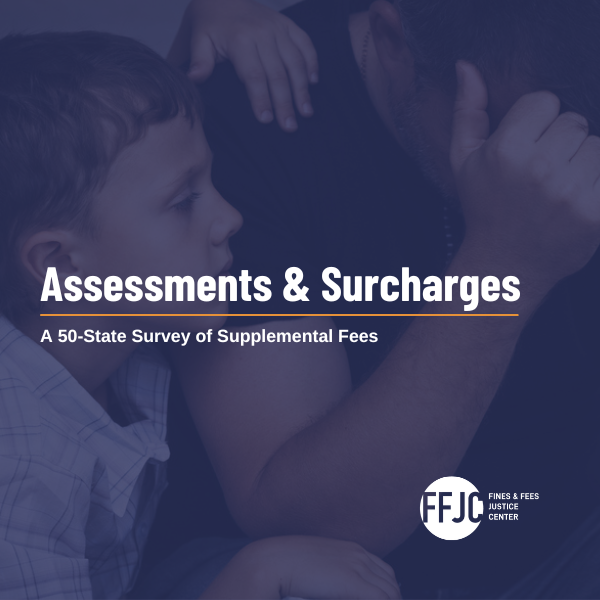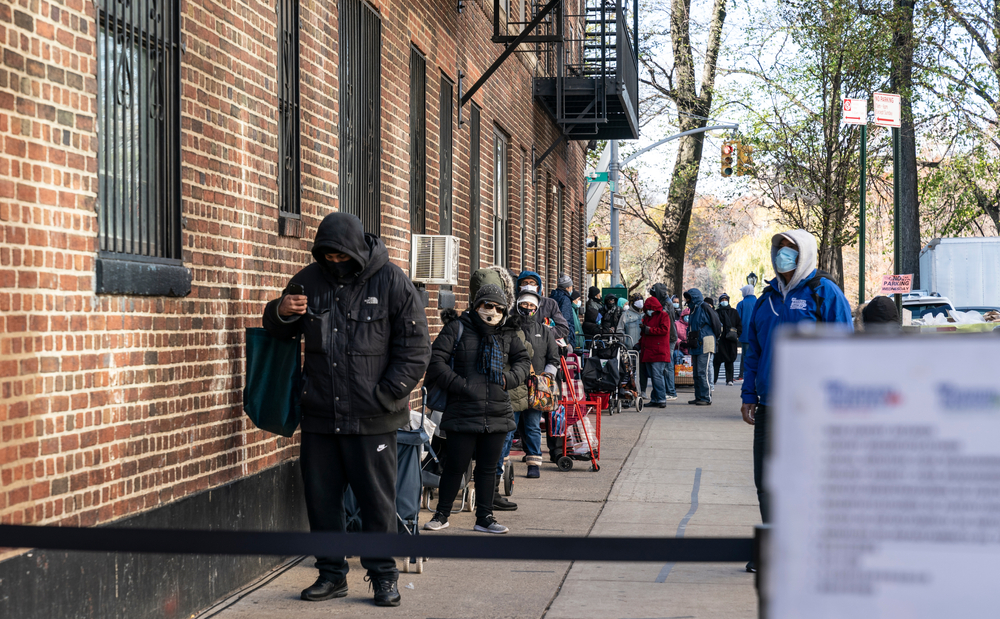First-of-Its-Kind National Survey Reveals Extent of Mandatory Surcharges & Assessments Imposed in Every Traffic, Criminal, or Local Case
Momentum to End Justice Fees Growing Among State & Municipal Policymakers
Today, the Fines and Fees Justice Center (FFJC) is releasing Assessments and Surcharges: A 50-State Survey of Supplemental Fees. Examining statutes and rules from all 50 states and DC, this new report uncovers a system of hidden taxes that are assessed in nearly every criminal, traffic or local ordinance case. They fund not only the justice system, but other government programs — ranging from autism research to independent living programs to state and municipal general funds.
For decades, states have used justice fees to raise revenue, which are now imposed throughout the criminal legal system. But there is a particularly pernicious category of fees imposed by the courts on people simply because they are involved with the justice system. Whether they are called administrative assessments, surcharges, court costs, privilege taxes, docket fees, or something else, the one thing these fees have in common is that they are imposed in nearly every criminal, traffic, or local ordinance case — regardless of the offense, sentence, or specific circumstance of the particular case. The report calls them “assessments and surcharges.”
Sometimes assessments and surcharges are used to fund court operations or administration, but they also often fund things that have no connection to the justice system at all, including a host of other government agencies, programs, services, or research.
“Fees are merely hidden taxes — a way for governments to collect more revenue from hardworking taxpayers without the ordinary transparency of traditional taxes,” said Americans for Prosperity’s Jeremiah Mosteller. “Rather than using courts and judges to secretly raise revenue in unsustainable and inconsistent ways, our governments should fully fund our justice system and have to account for the money they collect and spend.”
Judges are typically required to impose assessments and surcharges without any consideration of whether a person has the ability to pay. People who can’t afford fees are subjected to punishments that trap them in a cycle of poverty and punishment: incarceration, prolonged or indefinite supervision, driver’s license suspension, and additional fees. Communities of color and low-income communities suffer the most, as state and local governments attempt to extract billions of dollars from individuals and their families.
Meanwhile, for courts or other government programs dependent on the revenue created by these assessments and surcharges, the lack of reliable collections can leave them with unstable budgets.
Legislative reform efforts are underway in numerous states — including Louisiana, New York, New Mexico and Oklahoma — to eliminate assessments and surcharges. Since Oregon eliminated its “unitary assessment” in 2012, dozens of states and localities in states both red and blue have enacted reforms to eliminate one or more fees. In October, Delaware Gov. Carney signed legislation eliminating a wide range of fees, including probation and parole fees, public defense fees, and juvenile system fees.
“It’s encouraging that policymakers in Oklahoma and across the country are taking a hard look at eliminating the widespread use of assessments and surcharges in the justice system,” said Oklahoma Policy Institute’s David Gateley. “It’s a lose-lose situation for everyone — policymakers must gamble with unreliable budgets and revenue, while hard-working families face devastating consequences to their livelihoods if they can’t make a payment.”
Excessive reliance on surcharges and assessments is far from just a red-state problem. In New York, lawmakers have introduced legislation to end the state’s “mandatory surcharge,” one of the most burdensome in the nation. In California — which has eliminated 40 fees in the last three years — individuals continue to be assessed $100 as a “penalty assessment” for every $100 they are fined.
“Creating budgets and programs that are dependent on citations, arrests and convictions is literally banking on people violating the law — if crime goes down, so does the revenue needed to fund the government,” said Tim Curry, FFJC’s Policy and Research Director and the principal author of the report. “Not only is funding the government this way inefficient — it is also deeply inequitable. No manner of punishment can magically create money that people simply do not have.”
Key Findings:
48 states and DC imposed one or more assessments and surcharges on people simply for being in criminal, municipal, or traffic courts.
- 32 states have statutes that automatically impose a fee that directly benefits court operations, either providing revenue to a specific judicial fund or a general court operating account.
- 19 states have statutes imposing a fee that raises revenue for a state or county general fund, at least in part.
- 32 states and DC have a mandatory fee that benefits a victims’ compensation fund, regardless of whether the case involves a victim. Depending on the jurisdiction, these fees can go as high as $10,000 per offense, and are imposed even if victim restitution is also ordered in a case.
- 29 states impose a fee to fund government programs, services, or agencies unrelated to the justice system.
- Examples of such government programs include public financing of legislators’ campaigns, a volunteer ambulance fund, local law libraries, independent living programs, autism treatment and research, sheriff pension funds, civil legal services, and even a law enforcement officer hall of fame.
- These also include justice-related fees that are charged against all defendants, even if the program had no nexus to the defendant’s case. Examples of such fees charged in some states against everyone — even if not applicable in their individual case — include assessments or surcharges for DNA database maintenance, drug education programs, community corrections or county jail fees, police academies or police training, and a death penalty prosecution fund.
Only 2 states do not have statutes imposing any universally mandatory assessment or surcharge.
- Although Idaho has several different fees that may be imposed under certain circumstances or for select offenses, we found no statutory fee universally applicable to all cases.
- Oregon eliminated its “unitary assessment” in 2012. Now all fees imposed at or after sentencing are dependent on factors other than mere court involvement.
Download and read Assessments and Surcharges: A 50-State Survey of Supplemental Fees









